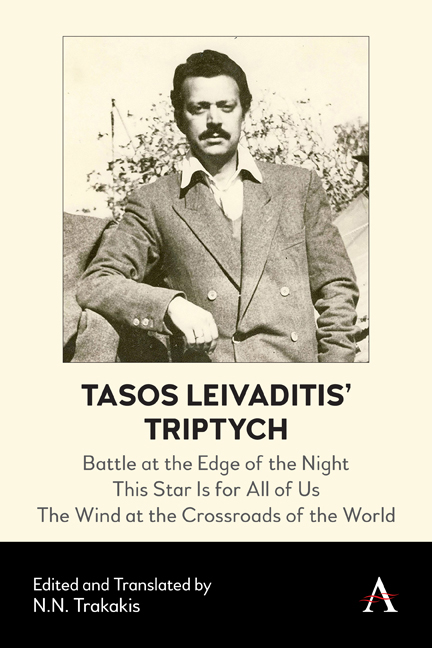 Tasos Leivaditis' Triptych
Tasos Leivaditis' Triptych Appendix II - ‘Literature On Trial’
Published online by Cambridge University Press: 15 September 2022
Summary
Last month the poet Tasos Leivaditis was tried in the five-member Court of Appeal for his work The Wind at the Crossroads of the World and Andreas Pagkalos for his translation and publication of Stalin's Economic Problems of Socialism in the USSR. This trial has deeply moved the broader community because the work of the young poet, Leivaditis, has been widely read and loved by the Greek public. For this reason, many prominent figures in literature and the arts as well as ordinary members of the community hastened to follow the trial and to support the persecuted poet. Four members of the Governing Council of the Society of Greek Writers – Agis Theros, vice-president, and the writers Stratis Doukas, Leon Koukoulas and Christos Levantas – attended the proceedings as witnesses in support of Leivaditis and spoke in the most ardent tones about the peace-loving content of his book, highlighting also the need in our country for freedom of artistic expression. Mr Theros said of Leivaditis’ book that it is a ‘sublimely lyrical composition full of humanism’, and concluded with the observation: ‘There is no genuine democracy in Greece’. Subsequently, Mr Doukas noted that ‘by isolating particular verses and phrases you could make even the Gospels look like revolutionary texts’. Similarly, Mr Koukoulas and Mr Levantas described the work as a hymn to peace and expressed the desire of all cultured people that an end be brought to the suppression of thought and writing.
However, the most important aspect of the case was the Court's finding in favour of democracy and freedom, acquitting both the poet and the translator, and ordering the restoration of the banned works. In this trial of literature special attention must be drawn to two positive signs. Firstly, the awareness shown by the accused poet of the bearing of his case for the cultural and artistic life of the land, an awareness displayed by the humaneness, dignity and sense of intellectual responsibility with which he invested his defence. Secondly, the address made by the Appeal Court's Prosecutor Mr Laskaris, who in full consciousness of his lofty mission before a literary case of this sort, became the most authentic and fervent voice of a democracy which has suffered yet another blow with the illiberal persecution of a poet.
- Type
- Chapter
- Information
- Tasos Leivaditis' TriptychBattle at the Edge of the Night', 'This Star Is for All of Us', 'The Wind at the Crossroads of the World', pp. 97 - 102Publisher: Anthem PressPrint publication year: 2022


